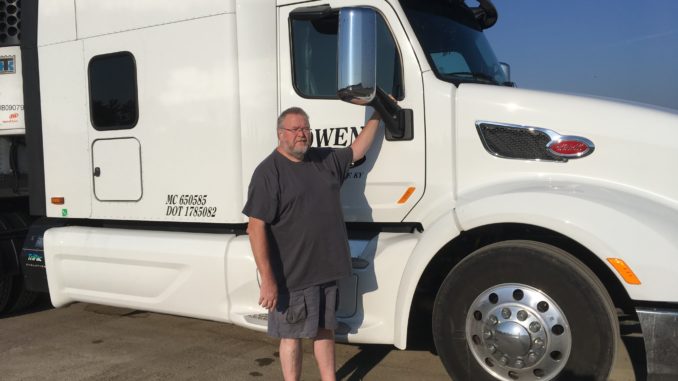
I often have people ask me if I liked being a truck driver, and the answer is always an emphatic “Yes!” There are basically two types of people in the world. There are homebodies, and then there are travelers, or road warriors. Now don’t get me wrong – you can be some of both – but generally the more you are a road warrior, the life of a truck driver will be much easier.
What was your career path? What do you like about truck driving as a job?
My long, winding path to truck driving started as a young man. I was interested in traveling all around the country and driving a truck. Most people are intrigued about driving the truck, handling the big rig and shifting the gears, and waking up in a different town every day.
My uncle, who was veteran driver of 20 years, gave me a few pointers about being a successful driver. The main one (and the legal one) was to not get married. Truck driving is a life for the single man, not a married one.
So I took his advice, at first, and decided that if I couldn’t drive the rigs, I would work on them instead. This lead me to an Automotive Technical College, where I learned all about truck engines, transmissions, and all the rest of the things I needed to know to become a mechanic.
While I was in school I even got a job working at a truck shop repairing trucks, and I learned how to handle the big rigs, backing them in and out of the shop as I worked on them. After I graduated, I went to work for a trucking company from Illinois that had set up a pilot shop for rebuilding their trucks in my home town.
This, I thought, would be the perfect job, but it turned out to be more of a rebuilding facility, than a truck shop. I rebuilt transmissions, 8 hours a day. They were already out of the trucks and came in on a pallet. Not what I was looking for. I moved onto a Caterpillar dealership, thinking I would get to work on Cat truck engines and be around the trucks. Unfortunately, this was not the case, as there were two divisions, earth-moving and trucks. I was hired in on the earth moving side and worked on earth-moving and mining equipment instead. Occasionally, I would get to work on a truck.
And then, on one occasion, I was hit by a car and nearly killed on the side of the highway.
The doctors told me that I would lucky if I could ever walk normally again. They told me that I needed a job where I could sit down at will. So after the accident, I decided to attend college to get a teaching degree. Forget about the life of a truck driver. Trucking was out of the question because pressing the clutch pedal up and down would be hard on my screwed-together joints.
Now I couldn’t drive trucks or work on them, so I thought I would be happy teaching about them. However, after 12 years of teaching people how to handle and work on trucks, my leg felt great, and I couldn’t see a reason why I couldn’t drive. So in the summer of 1999, I went to truck driving school and had no problems with either the truck itself or with my screwed-together joints.
After school, I finally got my first job as a truck driver at USA Trucks. I didn’t stay at USA Truck very long, and I drove for several different companies for many years all over the country.
What I like about Trucking:

What I like about driving is that it’s like being paid to be on a sightseeing vacation.
Where else can you get paid to see the country, especially on a beautiful sunny day, with the blue skies and the open road?
I liked the independence with the life of a truck driver. You work for someone, but you do it on your own terms. You can drive at night, in the middle of the daytime, or in the afternoon. It didn’t matter how you got the load to where it needed to go.
I liked to meet new people and see different places, not just the major sites, but the real backbone of the country.
The small towns, all the places and people that made up this country.
I had wanted to see Canada if I was lucky enough to get a load going into that country, and I was. It was great. I was always at peace when I was behind the wheel.
What does it mean to be successful in this job?
To be successful in this job you must be very dependable. The motto of the mailman always came to mind. The load must get through, no matter what. Driving is one job you can’t call in sick. How could you call in sick when you’re 500 miles from home? If you can move, you need to roll. A truck driver needs to be somewhat of an introvert. I do better by myself, rather than with a crowd of people. I work better alone. Although I can work with people, I like my solitude.
How do you get the mileage and money that work for you?
It’s a known fact that the more you drive, the more money you make. Over-the-road drivers are paid by the mile, so they aren’t making any money if that truck is not moving. However, you can’t run all the time. Some may try, but it’s not good for your health.
Drivers’ with a few years of experience make more money per mile, therefore they don’t have to drive as much. Rookies on the other hand, need the miles to make ends meet.
Like any other job, your experience dictates how much you make, and the safer you are helps as well. Companies like safe, dependable road warriors, people that can stay out a long time without wanting to come home and always get the load there on time.
For married drivers that don’t take their spouses with them, you need to establish how much home time is needed to maintain a healthy relationship with your partner. As a comparison, I always made about the same money as a mechanic and a teacher, but there were no expenses to driving a truck. You have to eat, no matter what job you have, but you don’t need a ten-thousand-dollar tool set to do your job.
How do balance that with the home time you want?
Generally, most driving jobs these days try to get drivers in for a day-and-a-half to two days out of the week. You should treat that as your weekend. Most jobs, you have one-to-two days off. For the lucky drivers, your time off is the weekend, Saturday and Sunday. If you happen to get off work on the same two days that your spouse or friends are off, then that’s a plus.
Not all jobs have it where both people are off at the same time, so you just need to make the best of the situation until a job with a better schedule comes along. Many drivers have to endure the tough schedule until they gain the experience to give them the kind of job they are looking for.
What advice would you give a new aspiring truck driver?
The best advice I can give any aspiring driver is decide up front if this job is just a stepping stone or it’s what you want to do. If you don’t want to do anything except be a driver, then remember your career is based on what you eat and how well you take care of yourself. Get some exercise; eat as healthy as you can; don’t let road rage and stress get you down. Do the best job you can, all the time, not just some of the time, and finally, the load must come first.
When the job is done, then you can play or relax, but not before or during the delivery. Too many times I have seen drivers late on their loads because they wanted to stay too long at a truck stop for whatever reason. Don’t fall into this trap. Taking too long of a break can really hurt you further down the road.
There are negative to any job, and I guess the negative to trucking would be the traffic. If you get stuck, then you sit there, and you’re not getting paid to sit. If a machine breaks down in a factory, you get paid to stand around and wait while the maintenance men fix the problem. If your truck breaks down, you don’t get paid while you wait to have it fixed.
These are the only negatives I have experienced. I always took them as a positive to catch up on my log book, read, take a shower, wash my clothes, etc. There are many things you can do while waiting to have your truck repaired. The positives always outweigh the negatives. You have the freedom of being your own boss.
Maybe the best advice I can offer anyone is treat the truck like it’s your own. How hard would you work if you had to make the payments on that rig? Most companies make no forced dispatches, which is true in a sense, but somebody must go to those places. If no one else wants to go, you can usually get more pay by negotiating a bonus for making those runs. Those undesired loads are also a good way to get some valuable experience.
The magic number is 2. Make it the first 2 years, and you will never have to worry about a job again, anywhere.
